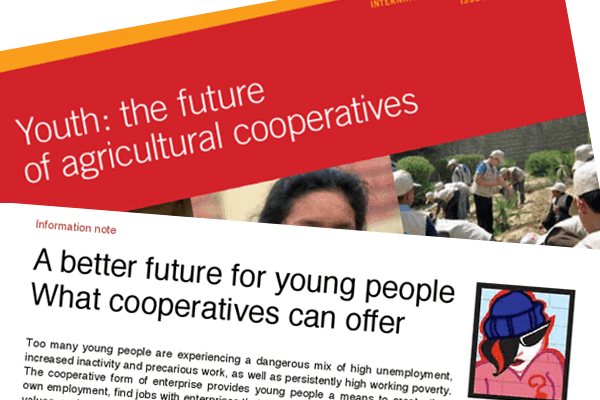La Conferencia Mundial de Investigación...
Unemployed youth can rely on co-operative enterprise

Two United Nations' agencies are backing co-operatives to help bring 75 million young people out of unemployment.
The International Labour Organization (ILO) and Food and Agriculture Organization released the statements to coincide with the United Nations' IYC closing ceremony over 19–20 November.
There are almost 1.2 billion young people aged between 15 and 24, and nearly 75 million are unemployed around the world, an increase of more than four million since 2007, and many become stuck in an experience trap – where they don’t have the experience to find work, but can’t get a job to gain experience, according to the ILO.
Both statements agree that co-ops give young people the tools to bridge that gap – whether it is through self employment, better access to financial resources or helping them pool their limited resources together.
The FAO statement, ‘Youth: the future of agricultural cooperatives’, notes that in developing countries where nearly 87 per cent of the world’s youth live, there are 500 million small holder farmers. Many young people do not perceive agriculture as a prestigious profession, however “agricultural co-operatives have proved to be an effective mechanism for engaging young people in agriculture".
‘A better future for young people – what co-ops can offer’, from the ILO, adds: “The co-operative model of enterprise contributes to youth employment not by only providing salaried employment, but also facilitating job creation through self-employment.”
The ILO says co-ops facilitate the school-to-work transition by offering on the job training through internships and apprenticeships. According to the report, in Ontario, Canada nearly 60 per cent of co-op interns found full time employment after completing a 26-week internship. However, co-ops often do not make it easy for young people to join. According to the FAO report, some co-op by-laws have membership laws, such as landownership and the payment of fees.
It also states that “culture and traditions characterised by hierarchical relationships in which young people are expected to obey older community members also complicate youth’s participation in co-operatives". This is particularly relevant when it comes to young women, who face additional challenges in getting their voices heard.
The ILO adds to this by saying that there is “insufficient” teaching of co-ops in the school curricula, but “to fill this gap, co-operatives in many countries offer co-operative entrepreneurship training and education".




